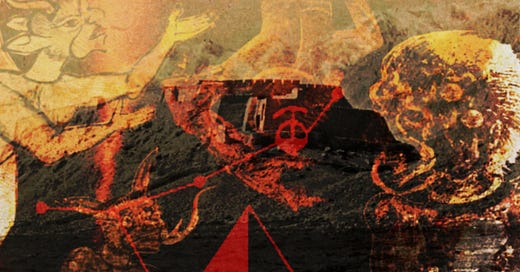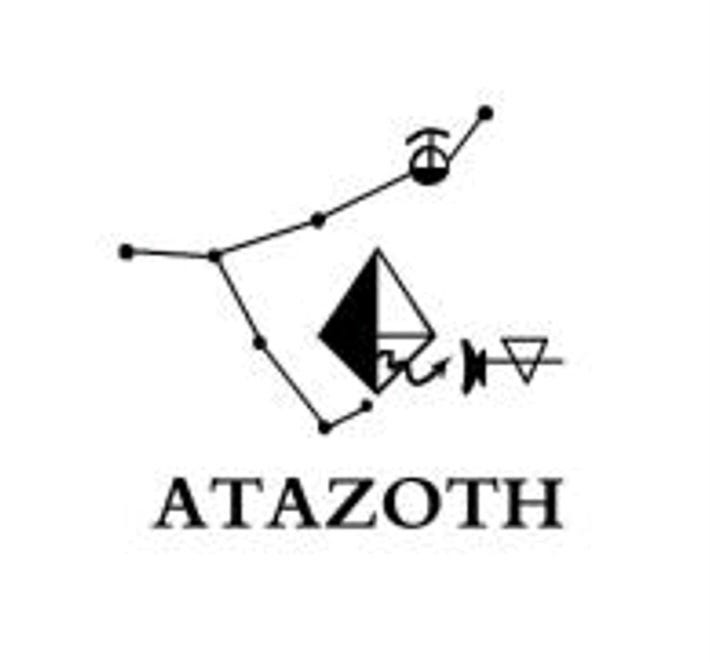Atazoth: Eastern Emanations
A Dark God of Traditional Satanism, Atazoth has roots in pre-Islamic Dark Middle Eastern Paganism and is mentioned in the Quran.
Taken from an esoteric manuscript in circulation among Traditional Satanist communities.
(AT-ṬĀGHŪT, ATAŻOT, توغاط لا)
An ancient pre-Islamic Arabian deity understood to be a supreme or cosmic spirit, which generates or creates lesser gods and goddesses, including Allat/Ereskigal, Dagon, and Zaggania. Generally considered to be inimical, Atazhot may be the Arabian equivalent of Sumerian Apsu or Greek Κρονος. Grammatically, [Atazhot] carries the general meaning of "to go beyond limits, a rebel, a tyrant, one who is oppressive, an intruder or intrusion, etc."
The Quran [e.g. 4:51, 4:60, 4:76] refers to Atazhot in several verses as a hostile and powerful force associated with Shaitan; ironically, heterodox Sufi groups in Egypt and the North Africa later identified Atazhot with Allah. In earlier translations of the Quran, Atazhot tends to be translated incorrectly as ‘Satan’ or ‘heathen religion’, whereas it is now understood to be a proper name. The plural form “Aṭawazhūt” is used as a patronymic to refer to pre-Islamic Arabian deities like Allāt, Dagon, and Zaggān[ia], all understood as the children of the deity. The term was later applied to Shaitan, alternately used to any supernatural power opposed to that of Islam.
Atazhoth may be understood as the cosmic expansion of Shaitan; conversely, Shaitan may be seen as the earthly representation of Atazhoth, as Gilgamesh is an earthly representation of Shamash.
The cult of Atazhot, largely similar to that of the Kaʿba, was made up of worshipping stones, bloody sacrifices and ritual processions (Ibn Hishām, Sīra, 54-5). In origin, it must have had in it various, complementary divine mythologies, given shape in different rituals, whose fusion into two rituals, that of the ḥadjdj. on one hand and that of the ’umra on the other, makes these last two incomprehensible through their composite and fragmentary character.
Thus much of what is identified today as “Islam” is really the remnants of an earlier pagan practice, a veneration of the cosmic spirit Atazhot which was understood to be (a) an intruder, (b) a lawless breaker of customs, (c) connected with Shaitan or (d) the origin of Shaitan, perhaps its source and master. Such Islamic rituals as the blood sacrifices, pilgrimages, sacred warfare, circumbulation of the Kaaba, and the Kaaba itself, are all remnants of the worship of Atazhot. In many ways, Atazhot was similar to the function of the Shaitan, except that the Shaitan was understood to be an earth-bound spirit, where Atazhot was entirely alien to Earth and identified rather cosmic, not terrestrial, forces.
This is to say that while the Quran depicts Allah in opposition to Atazhot it is more likely that Muhammad adapted the idea of a supreme being (Allah) from Atazhot. Thus on the one hand, Muhammad condemns Atazhot as an earlier supreme pagan deity, but on the other hand, it is equally likely that Atazhot was understood to be the secret 100th name of God, contained within the Quran yet concealed, and understood only to those few mystics who might realize that the apparent duality was simply an illusion. The confusion in the Quranic text may be, as in other places, deliberate.
The Atazhot Verses in the Quran:
"Do you not see how those given a share of the Scripture, now believe in Atazhot (توغاط لا)? They say of the disbelievers, 'They are more rightly guided than the believers." — Qur'an 4:51
"Do you [Prophet] not see those who claim to believe in what has been sent down to you, and in what was sent down before you, yet still want to turn to Atazhot (توغاط لا) for judgement, although they have been ordered to reject them? Shaitan wants to lead them far astray." — Qur'an, Sura 4: 60
"The believers kill for God's cause, while those pagans kill for Atazhot (توغاط لا). Fight the allies of Shaitan: Shaitan's strategies are truly weak." —Qur'an, Sura 4: 76
"There is no compulsion in religion: true guidance has become distinct from error, so whoever rejects Atazhot (توغاط لا) and believes in God has grasped the firmest hand-hold, one that will never break. God is all hearing, all knowing." — Qur'an, Sura 2: 256 2






This article reminds me of a book :The Devil’s Quran published under Martinet Press. A very interesting read!
One of the core problems of monotheism is that it simply cannot describe the complexity of reality.
Therefore, their monotheism must be expanded to a fundamental dualism, which, with groans and moans, is supposed to somehow keep the seething energies of experience in check.
But that doesn't really work either.
No matter what contortions they undertake - their pathetic attempt to focus everything on one point constantly fails and "the enemies" of their "god" constantly jump like lightning from every corner and end of their construction.
Older systems that described nature much better - now appear as "enemies" of their attempt. But these enemies are basically nothing other than the obvious consequences of monotheistic failure.
So Atatzoth changes positions even in the perception of monotheists, sometimes being this and sometimes that.
It is time for these monotheistic coercive structures to disappear again.